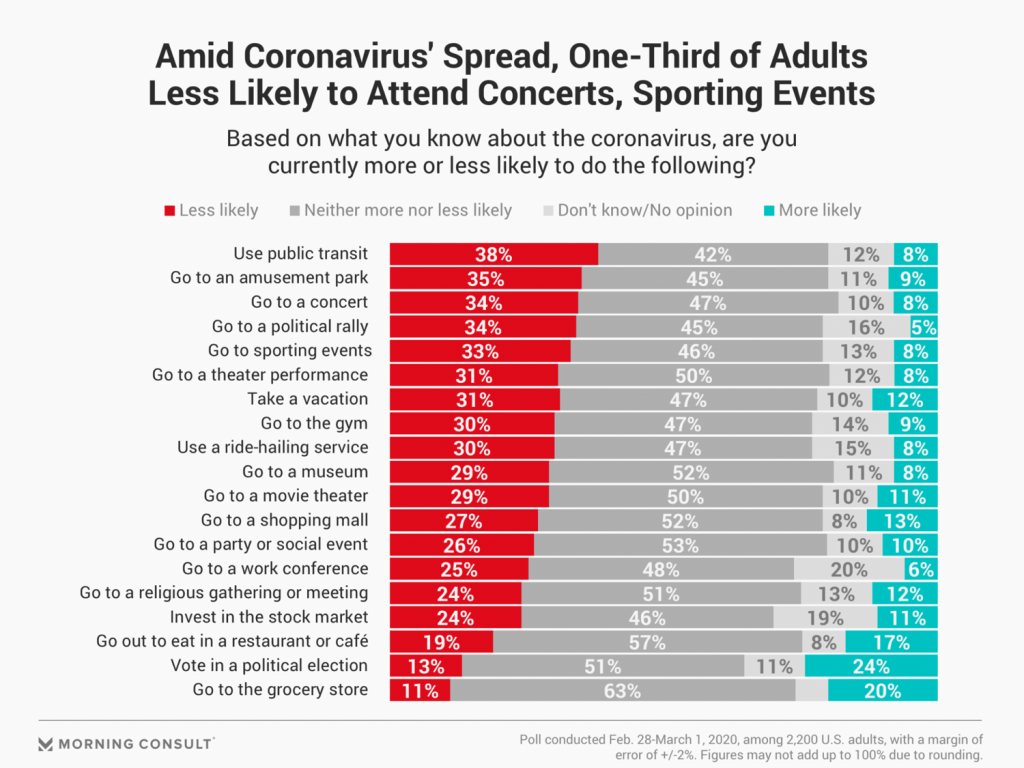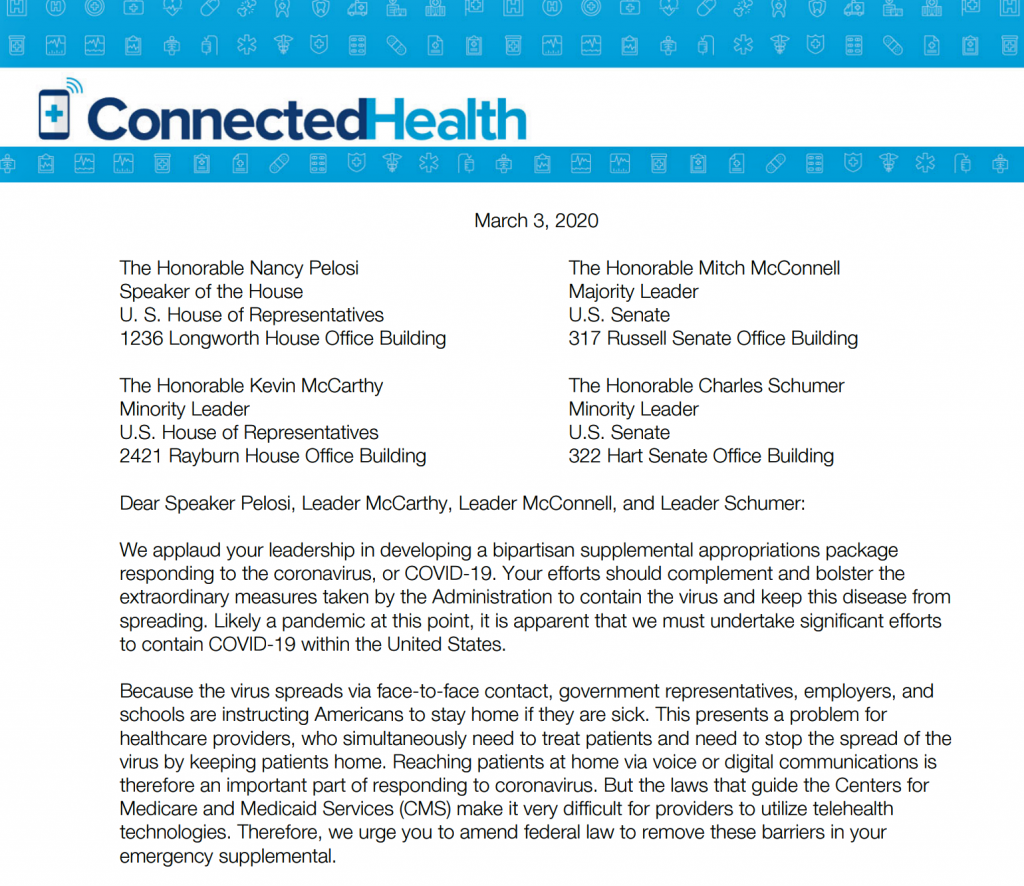 The coronavirus has shaken U.S. consumer confidence, both in terms of financial markets and personal health risks. COVID-19 is re-shaping peoples’ behavior and daily choices, from using public transit to choosing where to shop, based on Morning Consult’s National Tracking Poll #200276 conducted February 28-March 1, 2020.
The coronavirus has shaken U.S. consumer confidence, both in terms of financial markets and personal health risks. COVID-19 is re-shaping peoples’ behavior and daily choices, from using public transit to choosing where to shop, based on Morning Consult’s National Tracking Poll #200276 conducted February 28-March 1, 2020.
Morning Consult surveyed 2,200 U.S. adults, finding that 3 in 4 Americans were concerned about the coronavirus outbreak.
The first chart from the survey shows various consumer activities by peoples’ likelihood of choosing to do them. Clearly, our daily life-flows outside of our homes have been impacted by our perceived risks of the coronavirus: more people would be less like to use public transportation, go to an amusement park or a concert or political rally or sporting event, to take a vacation, go to the gym or a museum or cinema.
And one in four would be less likely to to attend a work conference — a topic top-of-mind for those of us in health-tech who’ve long planned to attend next week’s annual HIMSS conference, which as of today is still planned to go on — including a visit from President Trump, slated to speak on Monday 9th March about interoperability. [Sidebar: his son-in-law Jared Kushner spoke on interoperability at HIMSS two years ago].
Sarah Shevenock’s write-up of the poll commented that many companies, from CNN to Facebook, have cut work travel and conference holding and attendance, in the short run. And a change.org petition has been mounted by over 20,000 SXSW attendees calling for the huge meet-up to be cancelled in Austin.
One of the more interesting and timely items on here is second from the bottom of the chart — to vote in a political election. Note that this personal choice has the largest number of people that would be more likely to do this task than any other choice on the list that Morning Consult polled.
 Health Populi’s Hot Points: In challenging moments like this COVID-19 pandemic threat, we look for gifts of learning and opportunity — and this is one where the case for telehealth and broadband connectivity comes to the fore. Telehealth industry stakeholders have come together in the interest of connected health to advocate for telehealth to help people access care, expertise and support in the immediate term. TIME magazine covered this yesterday in a mainstream media story.
Health Populi’s Hot Points: In challenging moments like this COVID-19 pandemic threat, we look for gifts of learning and opportunity — and this is one where the case for telehealth and broadband connectivity comes to the fore. Telehealth industry stakeholders have come together in the interest of connected health to advocate for telehealth to help people access care, expertise and support in the immediate term. TIME magazine covered this yesterday in a mainstream media story.
And so a call-to-action was mounted in this letter to Congressional Leaders (addressed to Nancy Pelosi, Mitch McConnell, Kevin McCarthy, and Charles Schumer) from the Connected Health Initiative (CHI). The signatures for this letter included the CHI Steering Committee Members: the American Medical Association, Apple, Bose, Boston Children’s Hospital, Cambia Health Solutions, Dogtown Media, George Washington University Hospital, Intel, Kaia Health, Microsoft, Novo Nordisk, Otsuka Pharmaceutical, Podimetrics, Proteus Digital Health, Rimidi, Roche, Spekt, United Health Group, UC-Davis, University of Mississippi Medical Center Center for Telehealth, the University of New Orleans, and U-VA Center for Telehealth.
“Likely a pandemic at this point,” the letter explained, “it is apparent that we must undertake significant efforts to contain COVID-19 within the United States….Reaching patients at home via voice or digital communications is…an important part of responding to coronavirus….We urge you to amend federal law to remove (these) barriers in your emergency supplemental” funding packing for the virus battle strategy.
 The letter continues to argue for the elimination of financial barriers facing patients who would access telehealth care, waiving a copay requirement to ensure that people can get care when they need it. Bravo to CHI for responding in this way; and hoping Congress will move on this post haste. It will be important for the financial package to include broadband/connectivity support for consumer-patients who lack access to WiFi or data plans due to their high cost — as we call for broadband to be considered a social determinant of health in our ever-more connected lives.
The letter continues to argue for the elimination of financial barriers facing patients who would access telehealth care, waiving a copay requirement to ensure that people can get care when they need it. Bravo to CHI for responding in this way; and hoping Congress will move on this post haste. It will be important for the financial package to include broadband/connectivity support for consumer-patients who lack access to WiFi or data plans due to their high cost — as we call for broadband to be considered a social determinant of health in our ever-more connected lives.
Another aspect of consumer behavior is shopping, and grocery stores are a health/care destination as I detail in my book, HealthConsuming. So closer to my home, I shopped at my local Wegmans last Sunday morning and took an inventory of products labelled “anti-bacterial” that were still left on the store shelves. Like all U.S. metro markets, there was no Purell nor any private label anti-bacterial gels left on store shelves. But intriguingly, I found a few products, from Kleenex branded tissues to Dial bar soap, that were still supplied. Interestingly, Wegmans also had a large area in the front of the store, upon entry, with various offerings of citrus fruits — navel oranges in family-sized bags, clementines, and even cut-up peeled oranges ready-to-eat for those consumers keen to bolster citrus intake with the promising boost of Vitamin C.
 And it’s the color of Pantone Orange 21U that seems to be the go-to shade for anti-bacterial goods these days, shown in my personal picture curated from my shopping spree.
And it’s the color of Pantone Orange 21U that seems to be the go-to shade for anti-bacterial goods these days, shown in my personal picture curated from my shopping spree.





 I am so grateful to Tom Lawry for asking me to pen the foreword for his book, Health Care Nation,
I am so grateful to Tom Lawry for asking me to pen the foreword for his book, Health Care Nation,  I love sharing perspectives on what's shaping the future of health care, and appreciate the opportunity to be collaborating once again with Duke Corporate Education and a global client on 6th May. We'll be addressing some key pillars to consider in scenario planning such as growing consumerism in health care, technology (from AI to telehealth), climate change, and trust -- the key enabler for health engagement or dis-engagement and mis-information. I'm grateful to be affiliated with the corporate education provider
I love sharing perspectives on what's shaping the future of health care, and appreciate the opportunity to be collaborating once again with Duke Corporate Education and a global client on 6th May. We'll be addressing some key pillars to consider in scenario planning such as growing consumerism in health care, technology (from AI to telehealth), climate change, and trust -- the key enabler for health engagement or dis-engagement and mis-information. I'm grateful to be affiliated with the corporate education provider  Thank you FeedSpot for
Thank you FeedSpot for